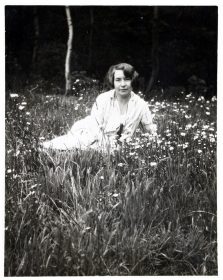Fritz Scherk and the history of a family business in Berlin
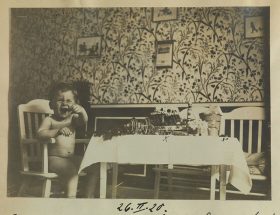
Fritz Scherk on his second birthday, Berlin, May 26, 1920; Jewish Museum Berlin, gift of Irene Alice Scherk, photo: Jens Ziehe
A beaming toddler sits naked on a lavishly laid birthday table, apparently having the time of his life. A photo like this could easily have been taken today, I thought, when I saw it in the diary that Ludwig and Alice Scherk kept for their son Fritz. In fact, the happy child would have turned 100 today. Being born in 1918 didn’t exactly promise a peaceful life, especially not for a member of a German-Jewish family. Actually the family’s second child had been planned for 1916, three years after the birth of their first son, but the outbreak of war got in the way. But on May 26, 1918, the time had come: Fritz was born next to his mother’s Bechstein piano—by candlelight because of the war, and just two minutes away from his parents’ business, the Scherk Perfumery on Kurfürstendamm.
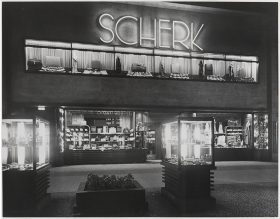
Scherk Perfumery and Leather Goods Store on Kurfürstendamm at night, Berlin around 1930, Jewish Museum Berlin, gift of Irene Alice Scherk
His mother had taken over sales and even production for a time while his father was in military service — not a foregone conclusion for the trained vocalist. In 1901, the then-thirteen-year-old niece of the owner of the Frankfurt cosmetics firm Dr. Albersheim (“A scent unlike anything that grows on earth!”) had fallen in love with the young employee Ludwig Scherk. In 1906, he moved to Berlin, initially as a representative of Albersheim, but soon the adroit businessman managed to start up his own company. After starting their own business, the two married in 1911 and had their first child in 1913.
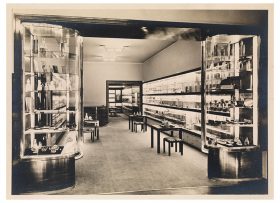
Interior view of the business on Kurfürstendamm renovated by Otto Salvisberg, Berlin 1928–1938, Jewish Museum Berlin, gift of Irene Alice Scherk
Alice and Ludwig Scherk were people who actively shaped their lives. In business matters, Ludwig strictly adhered to the principle “No banks—no stocks—no frivolities!” He never took out loans, and always only invested in surplus stock, limited to a few high-quality products. They were sold in aesthetically refined packaging; Alice’s artistic talent ensured that the right selection was made. Her influence is also evident in the new buildings constructed at the end of the 1920s: the brick factory building on Kelchstraße in Steglitz was designed by Fritz Höger and is still standing today; the business on Kurfürstendamm was redesigned by Otto Salvisberg; and, not least, the villa designed by Ernst Freud that the family moved into in 1931.
The parents were just as conscientious about childrearing. Music, sports, travel, and elaborate celebrations, including the children’s birthday parties, are all depicted in the diaries. Progress at school and moral development are also important themes. From the beginning, it was clear that the sons would take over the business. The fact that adventurous Fritz, who had inherited his mother’s musical talent, showed little interest in following the prescribed career path didn’t change anything about his parents’ plans. Alice noted: “If political catastrophes don’t destroy it, they will have a wonderful life task of continued work and building things up. Although recently you said at the table: ‘I don’t want to be the boss, I don’t know—I wouldn’t like someone to have to obey me.’ This is a very clear expression of your character, but hopefully you’ll see it like Daddy does, that everyone likes to obey him, likes to follow him, likes to work with him, and that everyone, like yourself, is a part of the whole.”
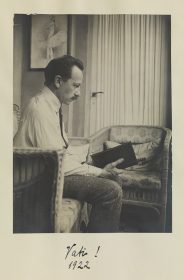
Portrait of Ludwig Scherk, Berlin, 1922; Jewish Museum Berlin, gift of Irene Alice Scherk, photo: Jens Ziehe
But the political catastrophes came. Already in 1923, in the midst of the global economic crisis, and shocked by the rise of Ludendorff and Hitler, the Scherks had already acquired visas to emigrate to Prague. Branches of the company opened in New York and elsewhere also offered a basis for business abroad, but, as Alice wrote, “we cling with every fiber of our beings to this German soil.” Then came 1933. Soon after the change of government, Ludwig Scherk received offers to buy the business, but he tried to keep possession of it. In 1934, Alice took her own life.
Like his brother Walter, Fritz went to France to complete his education, as his father wished. In 1938, Ludwig Scherk was finally forced to sell his company to Schering AG. While his father emigrated to London, Fritz remained in France, joining the Foreign Legion after the war broke out. Although he later would emphasize how difficult these years were, photos of him from this era show the same irrepressible good spirits, often holding a violin or accordion. “Now came the war, and it was Fritz’s aspiration to finally change his situation,” he versified with a pinch of humor later in life. For his father, it was the destruction of his life’s work, but for Fritz it was liberation from his imposed inheritance. But soon after the war, it caught up with him again. Ludwig Scherk died unexpectedly in 1946 while preparing to return to Germany, and Fritz, who was by then in Haifa, filed a claim for restitution. After a lengthy process, he was able to buy back his father’s company for the price of sale in 1938, and he returned to Berlin at the insistent request of the former staff, where he began reconstructing the heavily damaged factory.
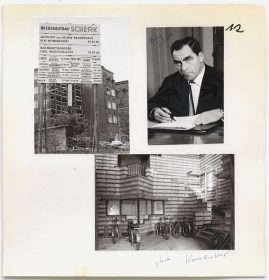
Fritz Scherk in the new factory: photos of reconstruction and a portrait of Fritz Scherk (1918–1995), Berlin around 1951; Jewish Museum Berlin, gift of Irene Alice Scherk, photo: Jens Ziehe
Under Ludwig Scherk, there had always been a good atmosphere at the business, and Fritz put heartfelt effort into creating familial solidarity. The Scherk company parties were legendary, and on St. Nicholas’ Day, the boss handed out hand-selected and sometimes hand-made gifts. At the same time, together with his wife Ruth, also born in Berlin, he founded the first Montessori kindergarten in Berlin.
In the 1960s, the company encountered increasing economic hardship. Fritz Scherk sold the business in 1969. Production was moved to Braunschweig. The Free University of Berlin purchased the factory building. Scherk products continued to be marketed by various companies for another two decades. Fritz Scherk finally dedicated himself to his own interests once again, studying psychology and working as a consultant. In 1995, he died on a family trip to Jerusalem.
Iris Blochel-Dittrich, Collection Documentation
You can find more photographs from the life of the Scherk family in our online collection. In 2010, a small showcase exhibition in the Jewish Museum Berlin dealt with the cosmetic companies Scherk and Dr. Albersheim. More information on the exhibition “You’ve come to a family of perfumers” can be found on our website.
